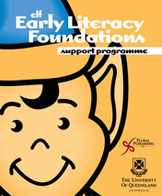Publication

Early Literacy Foundations (ELF)
Former Title: Early Literacy Foundations (ELF) (Australian Version)
- Details:
- 330 pages, Illustrated (B/W), 8.5 x 11"
- Included Media:
- CD Included
- ISBN13:
- 978-1-59756-174-7
- Release Date:
- 04/01/2007
Overview
Years in development and successful trialing, and the result of a unique and innovative collaboration between clinical speech pathologists and occupational therapists in consultation with teachers now you can deliver prevention intervention in developing young clients literacy skills.
Review:
I am a learning support teacher
. We used the ELF program to screen all of our Year 2 students at the beginning of this year
This program with solid classroom teaching has achieved amazing results. The use of body movements with explicit teaching of sounds and blending and gross motor work has been loved and appreciated by the students and myself. We have been blown away by this programs results!
- Natalie Arnel (Learning Support Teacher)
About the Set
The development of literacy skills (including writing, reading and spelling) is seen as paramount in the early years of schooling. This is a challenging time for some students when many skills are being mastered simultaneously.
Researchers at Australias University of Queensland Schools of Health and Rehabilitation Sciences found that many students who experience difficulties in the area of listening, reading or spelling also tend to struggle with motor, sensory and perceptual skills. This led to the development of a holistic intervention approach in which they recognized the equal contribution of both language and sensory motor development to the acquisition of literacy and aimed to detect struggling students at a very early stage in order to provision specific assistance through a team approach of learning support teacher, speech pathologist and occupational therapist.
The outcome: a comprehensive and proven program that focuses on normalising sensory-motor function to allow acquisition of phonological awareness and directly apply it to reading and spelling.
Evidence-Based, and Proven in Practice
The initial ELF program was devised in 1999 in collaboration between Speech Pathology and Occupational Therapy in the School of Health and Rehabilitation Sciences at the University of Queensland, Australia. This program focused on phonological awareness and its application in reading and spelling, as well as the motor and sensory skills necessary to plan and execute precision tasks such as handwriting and cutting.
Between 1999 and 2002, seven trials of the program were conducted in a range of schools across Brisbane, including schools with differing socio-economic status and needs. The authors also trialed a number of different implementation models, including withdrawing students in small groups, or very large groups (depending on school needs). Based on the results of these trials, and with a large body of supporting research findings, the ELF Support Program was devised as a self-contained package which could be implemented by specialist teachers to groups of students.
Background to the ELF Support Program:
The ELF Support Program is based on prevention intervention [and] has been designed so that all activities have multiple goals both metalinguistic and sensory motor. This represents a major point of innovation within the field of early literacy intervention
.The aim is to screen students in the midst of their learning and identify [those] slow to master skills and who may be at risk for future literacy difficulty. [They] are then exposed to a specific program to boost their skills and learning. If intervention is provided while the skill is still being learned, early learning is as accurate as possible. If students are able to learn appropriate support strategies at the same time as they are learning the material in the classroom setting, many will go on to learn with their peers, preventing or reducing the risk of delayed mastery and subsequent labeling.
- From the Authors Preface
Proven in use in schools throughout Australia, and now approved by state and national government education bodies, The Early Literacy Support Program comprises:
- Resource Manual - A step-by-step how-to guide that clearly takes you through the background to the program and its effectiveness, student selection and early problem detection; the implementation of the program, from equipment to monitoring and recording of data complete with ready-to-use observation sheet and completion report; and a comprehensive coverage of the screening process, detailing metalinguistics and sensory motor screening, and administration of class screening programs covering phonological matching, developmental and non-word spelling, writing, cutting and visual tasks, and sensory motor tasks.
- Theme Book on CD-ROM - Packed with thematic activity sessions from bodies, through animals and aliens, to the circus with each clearly outlined to the reader, and including prep-sheets, reproducible activity sheets and full instructional materials.
- ELF Posters - Reproducible posters that can be used on walls, boards, or desktops to illuminate tasks and encourage student participation






